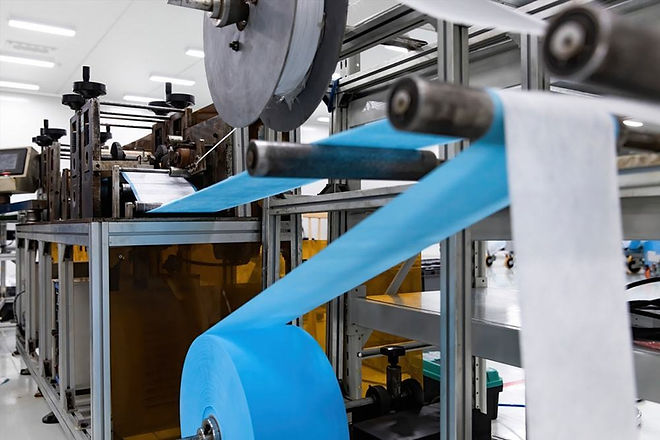
Poly-Hexidine benefits extend across many applications.
Less contamination and reducing waste provides a more sustainable future.
Healthcare Industry
Face Masks and PPE
A face mask acts purely as a filter, capturing micron sized microbes and particles and trapping them in the layers of the mask. The microbes remain active as masks are removed and handled enabling cross-contamination by touching other surfaces. The average usage of surgical masks is approx 3-10 masks per day per member of staff because the risk of cross contamination to surfaces, and ultimately patients, is very high.
Likewise, traditional isolation and surgical gowns function acceptably as a barrier layer of protection. However, it is has been well documented within the infection prevention literature that occupationally acquired infections of health care workers and cross contamination within facilities is quite commonly caused by improper doffing procedures and contact with infected protective garments.
Poly-Hexidine technology actively and consistently destroys bacteria, viruses and fungal spores at a log 6 kill within seconds. Masks made with Poly-Hexidine can be used much longer and reduces the number of masks required in healthcare environments. The result is fewer masks ending up in landfills or being incinerated and releasing CO2.
Hospital Cubicle Curtains
Hospitals, nursing homes, emergency care centers, surgery centers use cubicle curtains for patient privacy and easy access to treatment areas. These curtains are a problem area because they retain high microbial loads. A troublesome culprit that is a particularly hard bacteria spore to kill due to it’s tough exterior shell is C-Diff. Numerous studies have shown that even after aggressive laundering, C-Diff spores remain in the curtain material and are reintroduced back into the clean environment. This wastes a tremendous amount of resources, water/energy and detergents without necessarily solving the sterilization problem.
Curtains with Poly-Hexidine technology negates the concern about cross contamination and significantly reduces the number of times a curtain needs to be laundered as it acts continually to kill microbial contaminants.
Food Packaging Industry
Plastic food packaging has an enormous impact on our environment, usually ending up in landfills, or worse, our oceans. Pollution in our oceans makes headlines around the world.
Food packaging films made with Poly-Hexidine technology help reduce harmful microbials by actively killing e-coli and other food borne pathogens without leaching into the foods they protect. The result is less microbial contamination and longer shelf life. Longer shelf life means less packaging used and less waste going into our landfills and oceans.
Textile Industry
For clothing, linens and sportswear, untold volumes of water, energy and detergents are being consumed to remove odors from textiles.
Integrating Poly-Hexidine technology into these materials to actively kill these bacteria reduces the need for frequent laundering and use of harsh deodorizing chemicals. The results are less energy used and fewer chemicals draining into our streams, rivers, and oceans.
Commercial & Residential Air Filtration
Millions of air filters end up in landfills every year. As the name implies, an air filter removes particulates from the air and traps them in a layer of plastic mesh. Bacteria, spores and viruses on the surface of the filter can survive for weeks. Additionally, regular changing of the filter creates an opportunity to disturb and spread the microbial particles.
Integrating Poly-Hexidine technology kills harmful microbes rather than just trapping them. This reduces air-borne contaminants in homes, commercial buildings, hospitals, airplanes and car cabins. Performance is improved and the life of the filter is extended and that means less waste and fewer filters in landfills..